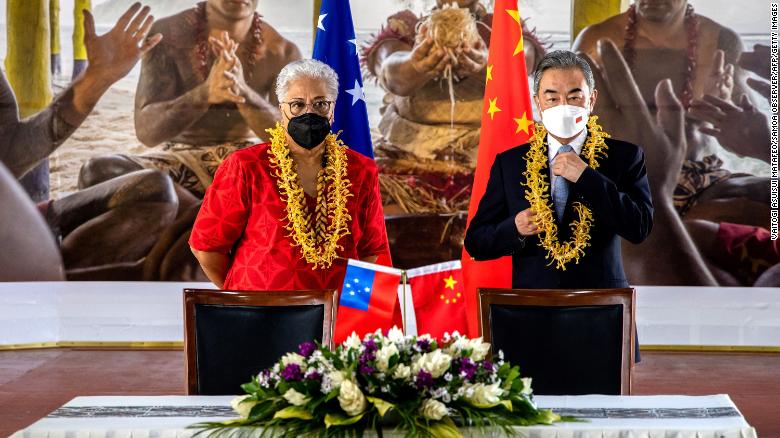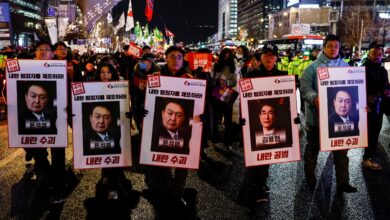
Hong Kong (CNN) – The island nations that stretch across the South Pacific — sparsely populated atolls and volcanic archipelagos, known more for tourism than lucrative natural resources — may not seem, at first glance, to be a major geopolitical prize.
Yet, Pacific Island countries have become the latest arena for a great power contest between the United States and China.
That contest was thrown into sharp focus in recent days, as China’s Foreign Minister Wang Yi completed a 10-day tour of eight countries to promote cooperation and a sweeping, regional security and economic proposal with the potential to significantly ramp up Beijing’s role in the South Pacific.
Wang’s trip, and news of that proposed deal, sent the powers with longstanding relationships in the South Pacific — Australia, New Zealand, and the United States — scrambling, with Washington pledging last week to intensify its own support of the region and Canberra dispatching its foreign minister on a dueling diplomatic tour.
Some Pacific Island leaders pushed back on the posturing, stressing instead the importance of other issues, such as climate change, with Fiji’s Prime Minister Josaia Voreqe Bainimarama noting that, “geopolitical point scoring means less than little to anyone whose community is slipping beneath the rising seas.”
China’s bid for a larger, regional pact ultimately didn’t win backing at a 10-country meeting last week, but Wang did leave behind a clear message of China’s interest in the region — and heightened concerns that these island nations, which carry a history of strategic importance, will have little choiparkce but to navigate the rising tensions between major powers.
Island hopping
From the vantage point of Washington and Canberra, Beijing is bolstering ties with capitals across the South Pacific, so it can potentially seek to parlay infrastructure deals, or even seemingly modest security agreements, into a military foothold.
That would drive a wedge into the two countries’ military presence in the South Pacific, where the US maintains military bases and a Compact of Free Association with the Federated States of Micronesia (FSM), the Republic of the Marshall Islands (RMI), and the Republic of Palau, which gives it military operating rights over the airspace and waters of these nations.
Australia operates its own navy in the region and has long maintained defense and security ties with neighboring island governments, including on peacekeeping and military training. Both Australia and New Zealand are part of regional and bilateral security pacts in the Pacific.
The region was included in a joint statement between US President Joe Biden and New Zealand Prime Minister Jacinda Ardern last week, which voiced concern about “the establishment of a persistent military presence in the Pacific by a state that does not share our values.”
And for the United States and Australia threats to the regional status quo have echos of World War II, when the islands were used by imperial Japan to threaten Australia, before becoming part of an American “island hopping” offensive that ultimately played into the turning tide in the Pacific.
“The islands sit astride a key passageway for US and Australian naval ships and merchant ships,” said Timothy Heath, a senior international defense researcher at the RAND Corporation in Arlington.
“If China could establish (military) basing rights, it could deploy warships and aircraft temporarily to the islands. (Its) ships and airplanes could threaten US and Australian ships and aircraft that passed by,” he said, adding that even a boosted presence, short of a military one, could help China “collect sensitive intelligence on US and Australian military operations.”
Winning friends
China’s interest in building rapport with the Pacific Islands countries is not new. In the early 2000s, as the US was turning its attention toward perceived threats in the Middle East, a newly outward-looking China was starting on a path to become an economic and diplomatic partner for Pacific island countries — not least of all as it sought to win friends away from Taiwan, which is now only formally recognized by four of 14 South Pacific nations, after the Solomon Islands and Kiribati switched allegiance to China in 2019.
In recent years, as Beijing has pursued a more assertive foreign policy and expanded development funding globally in a bid to enhance its international sway, its visibility in the Pacific Islands, too, has grown. China has backed widely publicized projects in some Pacific Island countries — a national sports stadium to host the Pacific Games in the Solomon Islands, highways in Papua New Guinea, bridges in Fiji — and sent high-level envoys to the region, including two visits from Chinese leader Xi Jinping, once in 2014 and again in 2018. It’s also become a major trading partner for Pacific Island economies.
And while Australia has remained the top aid donor in the region for the past five years, according to data collected by the Australian think tank Lowy Institute, experts say that in some parts, perceptions are that China is a more expedient partner than traditional donors.
“There is an assumption that China will do more,” said Celsus Talifilu, a political adviser based in Solomon Island’s Malaita Province, who has been an outspoken critic of how the national government has handled its recent relations with China.
“It may be that our politicians are thinking that it’s easier to deal with China in terms of implementing things on the ground quickly, in comparison to other donors that have been in the Solomons for a long time yet have been very slow,” he told CNN.
Containment concerns
Beijing’s aggressive behavior in the South China Sea and its steadily expanding navy have changed how Washington views China’s diplomacy and outreach, including in the South Pacific.
Concerns that Beijing may have military ambitions in the region were fueled in April after China and the Solomon Islands signed a security agreement, sparking fears of creating an opening for China to establish a military presence in the country.
Wang, the foreign minister, has been quick to deny China’s latest moves have had a military angle, saying flatly of the Solomons deal that Beijing did not intend to build military bases and calling on observers “not to be too anxious” about China’s overall aims in the region, where he said it has “no intention of scrambling for influence.”
“China and developing countries realizing common development and prosperity will make the world fairer, more harmonious and stable,” Wang said, following a meeting with Pacific Island leaders last week.
Many observers say Beijing may be a long way from a military foothold, but agree that expanding its presence overseas would be a logical next step for an ambitious power like China.
“As China grows it is little wonder that the Chinese security interest in the (South Pacific) region will also grow,” said Denghua Zhang, a research fellow at The Australia National University’s Coral Bell School of Asia Pacific Affairs in Canberra.
One driver may be concerns, often discussed by Chinese scholars and strategists, of China being enclosed by the US and its allies. This has bolstered the concept of breaking the “island chains” viewed as hemming China in, in particular, with military bases on islands near China and in the Pacific, according to Zhang. These include US military bases in Japan and Guam, and a military presence in the Philippines.
In an analysis the US Indo-Pacific strategy published last year, Shanghai Academy of Social Sciences senior researcher Liu Ming and co-authors expressed this concern, writing: “The [American] principle of containment is to politically isolate China throughout the region by expanding a network of allies and partners, so as to draw more “Indo-Pacific” countries into the US camp.”
Blue Pacific
China’s growing outreach has left other powers on the back foot — scrambling to energize their presence, from Australia’s “Step-Up” policy and New Zealand’s “Pacific Reset,” both in 2018, to Washington’s “Pacific Pledge” a year later.
“They’ve all developed these new initiatives for the Pacific … essentially amounting to the same thing, wanting to ensure that they remain the partners of choice and China is not gaining the upper hand,” said Sandra Tarte, an associate professor in the University of the South Pacific’s School of Law and Social Sciences in Fiji.
To some extent, there is an upshot for the Pacific Island countries: as these powers try and outdo the other, this can bring more focus to and leverage for local governments.
“The Pacific Island people … are not new to global, geopolitical competition,” said Tarcisius Kabutaulaka, associate professor of Pacific Islands Studies at the University of Hawaiʻi at Mānoa.
Vanuatu’s Prime Minister Bob Loughman Weibur and visiting Chinese Foreign Minister Wang Yi pose with officials following a signing ceremony for agreements between the two countries in the capital city Port Vila on June 1, 2022.
He points back to the 1800s when the islands were the focus of colonial competition through to the Cold War, where there was pressure for nascent Pacific Island countries to shun Soviet advances. But as time goes on — and if US-China tensions continue to rise — the balancing act may become more difficult, Kabutaulaka said.
That may have been one factor in why the sweeping pact conceived of by Beijing did not ultimately come to pass last week. Another may be the region’s “Blue Pacific” concept, which emphases collective decision-making about the region through consultation with all members.
“Our position was that you cannot have regional agreement when the region hasn’t met to discuss it,” Samoa’s Prime Minister Fiame Naomi Mata’afa said Thursday.
Wang did sign a number of bilateral deals including on areas of economic cooperation, disaster management and policing equipment. But even without a deal — this time — competition and varying views on engaging with China could chip away at cohesion in the region, said Kabutaulaka.
“I’m concerned that geopolitical competition will … affect the strong regional bond.”




